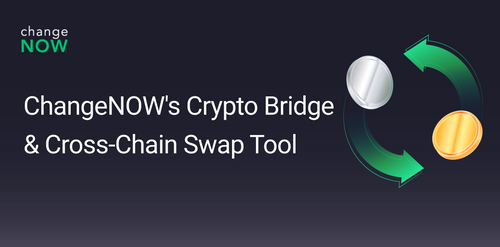Weekly Recap: Terra Remains in Limbo as Cyprus Embraces Crypto
Cyprus Worked Out Details for Pro Crypto Regulations
On Thursday, the Cyprus government put together a draft defining the rules for crypto activity within its jurisdiction.
Most importantly, the Cyprus crypto draft is expected to see approval before the EU establishes a common regulatory framework. The draft details a properly curtailed use of cryptocurrency. Kyriakos Kokkinos, the Cyprus Deputy Minister gave some insight into the country's stance on crypto. He explained that the government will develop policies that accommodate crypto while respecting both existing and possible future frameworks.
Cyprus has always been ahead of the curve in terms of innovation. Last year, the county was recognized by the European Innovation Scoreboard as the second most progressive nation in Europe.

OpenSea Unveils New Marketplace Seaport
On Friday, OpenSea announced the launch of Seaport, a marketplace protocol for trading off NFTs using a wide variety of tokens.
According to the leading NFT marketplace platform, Seaport will be a decentralized marketplace protocol. OpenSea stated that they will participate in the upcoming marketplace like every other user. They will neither serve as a centralized authority nor intermediary for facilitating transactions carried out over the new protocol.
In addition, OpenSea says Seaport will support the trade-off of NFTs using a somewhat trade-by-barter system. NFT holders will be able to swap their digital collectibles in exchange for other tokens besides Ether. Users can barter with a variation of other token standards on the Ethereum blockchain. The other alternatives to Ether are ERC20, ERC721, ERC1155 tokens.
Other additional features of the Seaport NFT marketplace include tipping and search filters for specific NFT traits and characteristics. Buyers may decide to pay more than the floor price of the NFT as a tip. However, tips cannot exceed the purchasing price of the art.
LUNA Founder Drops Burn Address, but Warns Against It
LUNA founder, Do Kwon, pointed out how LUNA holders essentially lose their tokens if they decide to burn them. Terra holders had previously clamored for the burning of excess LUNA tokens to artificially boost demand, as LUNA and its stablecoin counterpart UST are both suffering from an outrageous price collapse at the moment.
While the founder finally acquiesced to the demand for burning LUNA tokens, he reiterated his warnings. “There you go,” the South Korean executive initially tweeted on Saturday, along with the burn address. Two days later, on Monday morning, Kwon reminded Terra users that he saw no sense in burning the tokens. Kwon explicitly stated that it is a futile attempt to revive price since tokens only end up lost.
For now, the Terraform foundation is hard at work, brainstorming various strategies to reverse the bearish market sentiment dominating the crashing token. While the team suggested the burning of excess LUNA tokens to artificially boost demand, Do Kwon hardly agrees with this approach.
Burning tokens is the reduction of the total amount of tokens in circulation by sending them to a burner address. Afterwards, the target address is discarded, flushing the tokens out of the ecosystem.
The Crypto Verse Anticipates Long-Awaited Ethereum Merge
Many ETH users cannot wait for the long-promised Ethereum merge, especially following Vitalik Buterin’s comment that the merge could be near. In the past month, the crypto market has taken a dive, with Ethereum losing more than half the high it recorded two months ago.
Given the present crisis, the Merge couldn't come at a better time for the Ethereum space. And so, the Ethereum co-founder, Vitalik Buterin has doubled up efforts in view of realizing the merger by August. Despite ETH developers’ tenacity, Buterin softly warned that the Merger is still unlikely to take place until fall.
The Ethereum team believes that the imminent test on Ropsten Testnet clarifies the launch timeline for the Ethereum Merger. Finally, the test run will take place on the 8th of June.
Ethereum recorded some gains over the weekend, after experiencing a massive bearish price action last week. However, its trading price appears to be finding some bearing.
Following the UST Crash, Other Stablecoins Lose Their Peg
Asides UST, two other algorithmic stablecoins continued to stutter in the past week, still depegged from the $1 mark.
The crypto market has taken a long, quick trip to the downside in recent months. Terraform coins took the biggest hit with UST unable to sustain its anchor to USD. Following the depegging, the stablecoin dropped by 90%, falling from the stable one-to-one dollar ratio. UST now trades around a dime.
While most stablecoins have remained resilient despite the trying situation of the market, algorithmic stable tokens like Kava’s USDX dipped as well. Another stablecoin to follow UST’s breakdown after more than a week was DEI.
DEI unhinged from its peg currency and fell loosely to much less than one dollar within two weeks. Market experts believe that the crash is a side effect of the UST dip. The TerraUSD sent a shock wave of fear which has worried investors pulling out their assets in stablecoins. DEI, however, has been responsive, and is up 30% in 24 hours at time of writing. It also trades at $0.86, now closer to its original $1 mark.
Terra Community Says NO to Founder Do Kwon Hard Fork Proposal
The Terra Community unequivocally turned down the LUNA founders proposal to split LUNA's blockchain last week.
As a solution to current crises in the LUNA camp, Do Kwon had pitched the implementation of a hard fork. This involves the splitting of LUNA's blockchain into two separate, independent chains: Terra Classic and Terra. According to the ecosystem's founder, the emerging blockchains will be facilitated by the Luna Classic (LUNAC) and Luna (LUNA) native tokens respectively.
However, the Terra community strongly disagrees with him and would rather go with the initial proposal of burning excess tokens. The sentiment in the Terra community is that the Terra team prefers to take actions in favor of whales. They suspect that the hard fork will be fashioned to protect big investors at the expense of the average majority.



